The Paris correspondent of the Times makes much of the
appointment of M. Herbette to the French Embassy in Berlin. In two bitterly sarcastic letters, the writer describes M. Herbette as an able but irritating Jacobin of extreme views, who, as "chief of the Cabinet of Foreign Affairs," has, the corre- spondent alleges, led M. de Preycinet into all his blunders, and would anywhere produce ruptures, misunderstandings, and irritations. He is not a trained diplomatist, though a trained official, and is so disagreeable that he can only have been sent to Berlin upon the theory that he will be innocuous, because Prince Bismarck cannot hate France more than he does, yet is determined not to go to war with her. He will there- fore simply neglect M. Herbette. The account is curious, and a strong democrat is certainly a strange choice for such a post; but it is. just possible that M. de Freycinet knows his man better than the Times' correspondent does, and that the appoint- ment is extremely offensive to the Orleaniats. M. de Blowitz sometimes expresses their antipathies, and they may not desire to see in Berlin an Ambassador likely to fill Prince Bismarck with suspicion of the Conservative Party in France. M. Herbette, too, is bitterly anti-English, making of Egypt a kind of personal question.


































 Previous page
Previous page